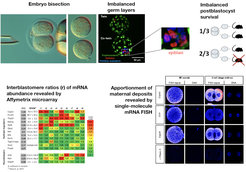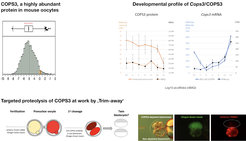Mouse Embryology Laboratory
PD Michele Boiani, PhD
Research projects:
- The apportionment of totipotency in mouse development and the putative role of oocyte deposits
- Proteome analysis and targeted proteolysis identify a developmentally relevant COPS3 deposit in mouse oocytes
The apportionment of totipotency in mouse development and the putative role of oocyte deposits

Ellen Casser was a DFG-funded PhD student in the Boiani group from 2016 until 2019. She defended her Doctoral Thesis on the “Cellular and molecular bases of developmental totipotency in whole mouse embryos and isolated blastomeres” on July 03rd 2019. Her 3-year work has been featured in 7 publications in peer-reviewed Journals. Her main achievement was the discovery that, contrary to the mainstream view, the sister blastomeres are discordant for totipotency: in two thirds of 2-cell mouse embryos only one blastomere produces sufficient epiblast, which is a prerequisite for postblastocyst survival. One of the molecular underpinnings of this discordance has been found in the level and distribution of the protein-coding mRNA of Cops3, encoding the 3rd subunit of the COP9 signalosome complex. Clearly, the first two blastomeres can be distinguished from each other, molecularly and functionally. For this discovery Ellen Casser was awarded the Basic Science Award for best poster presentation on a basic science topic at the 33rd European Society of Human Reproduction and Embryology Congress 2017. She is currently on a guest contract in the Boiani group until March 2020.
Selected work:
Casser, Israel, Witten, Schulte, Schlatt, Nordhoff, Boiani. Totipotency segregates between the sister blastomeres of two-cell stage mouse embryos. Sci Rep. 7(1):8299, 2017
Casser, Wdowik, Israel, Witten, Schlatt, Nordhoff, Boiani. Differences in blastomere totipotency in 2-cell mouse embryos are a maternal trait mediated by asymmetric mRNA distribution. Mol Hum Reprod. 25(11):729-744, 2019
Proteome analysis and targeted proteolysis identify a developmentally relevant COPS3 deposit in mouse oocytes

Steffen Israel has been a DFG-funded PhD student in the Boiani group since 2017. He is now finalizing his Doctoral Thesis on the “Multi-omics analysis of global gene expression dynamics in preimplantation mouse embryos”. His 3-year work has been featured in 6 publications in peer-reviewed Journals. His main achievement was the first report, in mammals, of gene function disruption achieved directly at the protein level, without DNA or RNA manipulation, by way of the ‚Trim-away‘ method. Building on a quantitative knowledge of the mouse developmental proteome, Steffen Israel is able to target and deplete proteins of interest e.g. COPS3 in mouse oocytes, so as to reveal developmental consequences, without the confounder of the gene product accumulated during oogenesis. Contrary to the original report that Cops3 was required after implantation (PMID 12972600), the targeted proteolysis has exposed a requirement for COPS3 already after the first zygotic division. Steffen’s work highlights the importance of understanding the molecular composition of gametes and early embryos beyond the transcript composition, in order to draw safer conclusions about the role of genes of interest. He is currently on a guest contract in the Boiani group until December 2020.
Selected work:
Israel, Casser, Drexler, Fuellen, Boiani. A framework for TRIM21-mediated protein depletion in early mouse embryos: recapitulation of Tead4 null phenotype over three days. BMC Genomics 20(1):755, 2019
Israel, Ernst, Psathaki, Drexler, Casser, Suzuki, Makalowski, Boiani, Fuellen, Taher. An integrated genome-wide multi-omics analysis of gene expression dynamics in the preimplantation mouse embryo. Sci Rep. 9(1):13356, 2019
Further information
A more detailed biography on Michele Boiani, his funding and publications are listed here:
https://orcid.org/0000-0003-2765-2781

